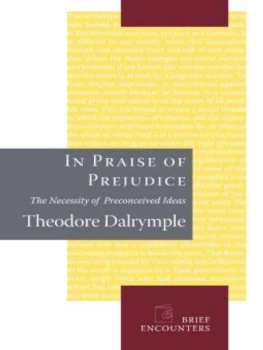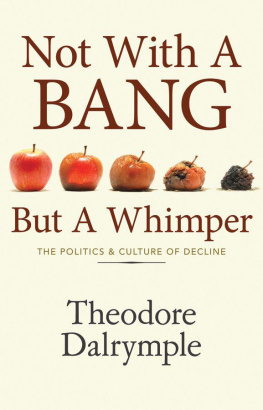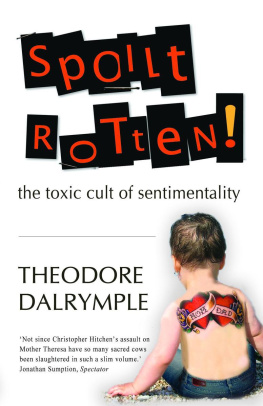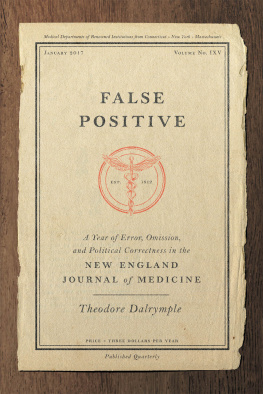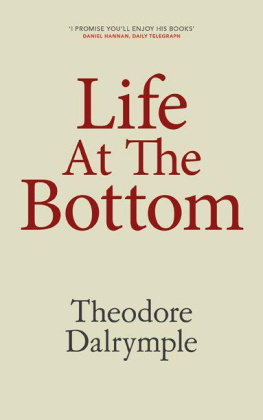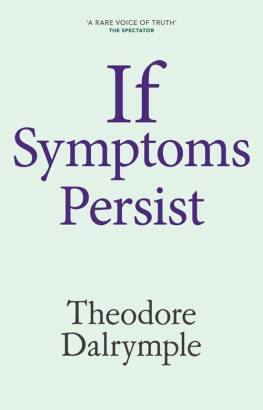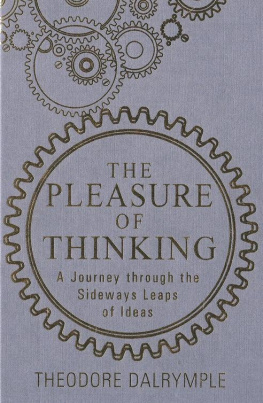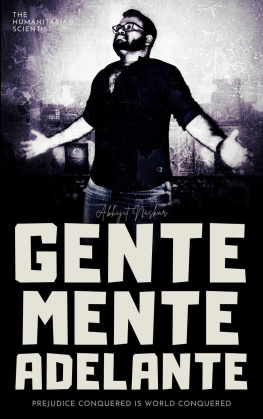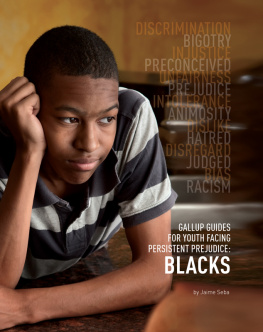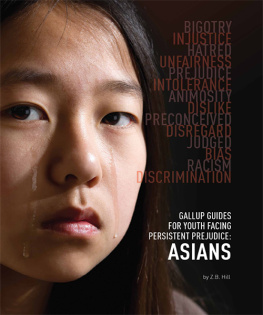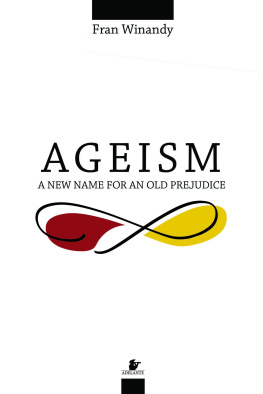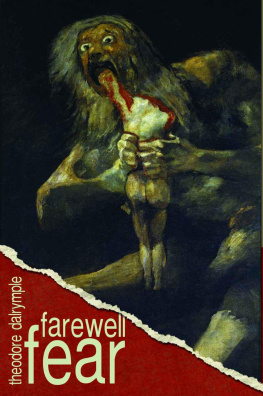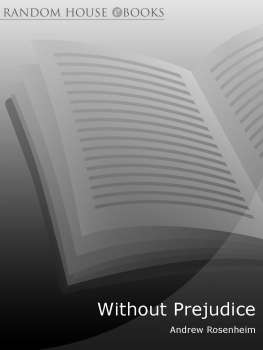Table of Contents
To the memory of Peter Bauer
He said, Macaulay, who writes the account of St. Kilda, set out with a prejudice against prejudice, and wanted to be a smart modern thinker; and yet affirms for a truth [what everyone already knows], that when a ship arrives there all the inhabitants are seized with a cold.
James Boswell, Life of Johnson
A.D.1768, Aetat 59
Starting from unlimited freedom I arrive at unlimited despotism.
Fyodor Dostoyevsky, The Devils
Prejudice Is Wrong, So Lack of Prejudice Is Right
THESE DAYS, there is a strong prejudice against prejudice: and this is exactly as it should be, is it not? For what is prejudice, if not wholly reprehensible? According to the Oxford Shorter Dictionary , prejudice is:
a previous judgement, especially a premature or hasty judgement. Preconceived opinion; bias favourable or unfavourable; prepossession... usually with unfavourable connotation. An unreasoning predilection or objection.
It follows, does it not, that we should strive to be entirely without prejudice?
The archetypical prejudice is that which relates to race. Indeed, the word race and prejudice go together like Mercedes and Benz, or Dolce and Gabbana. It is difficult to say exactly when this association formed, and certainly there was talk of race prejudice before the Nazis changed our moral outlook and priorities, if not forever (for who can see that far into the future?), at least for a long time to come. To hate, despise, depreciate, or discriminate against someone merely because he belongs to a certain racial group now seems to us the worst of all possible vices. This has helped to create a moral climate in which the expression of virtuous, and the abjuration of vicious, sentiment is mistaken for, or taken as the whole of, virtue itself. Let a man be an unscrupulous villain, so long as he utters the right phrases: that is to say, is not prejudiced.
No unprejudiced person, however, could deny the significance of racial prejudice in the production of some of the worst evils of the last century. If such prejudice is an antipathy based upon a faulty and inflexible generalization, as Gordon W. Alport, professor of psychology at Harvard, put it in his great work The Nature of Prejudice , then some of the worst massacres of that century of massacre were motivated, or at least made possible, by it. The fact that a massacre might take place in specific historical circumstances that lent a superficial plausibility to the motivating prejudice is beside the point. That Rwanda was being invaded by Tutsi rebels, and in Burundi to the south a massacre by a Tutsi government of every single Hutu who had attended secondary school had taken place within living memory, does not serve to excuse a genocide that could have taken place only upon a foundation of long-standing prejudice. One might put it like this: no prejudice, no genocide.
Even the entirely laudable desire to avoid future genocide, however, does not permit us to commit errors of logic. If the existence of widespread prejudice is necessary for the commission of genocide, it is certainly not a sufficient one. Nor does it follow from the fact that all who commit genocide are prejudiced that all who are prejudiced commit genocide. It is certainly true that if prejudice were a necessary condition of genocide, then to cure mankind of prejudice would cure it also of genocide; but what is desirable, at least in this one respect, is not necessarily possible. And an unachievable goal cannot be a desirable one.
I very much doubt whether anyone, at least in polite company, would admit to a prejudice about anything. To admit to a prejudice is to proclaim oneself a bigot, the kind of person who cant, or worse still wont, examine his preconceptions and opinions, and is, as a consequence, narrow in his sympathies, pharisaic in his judgments, xenophobic in his attitudes, rigid in his principles, punitive towards his inferiors, obsequious to his superiors, and convinced of his own rectitude. Such a one is not very attractive, to say the least. Better, then, to swallow ones prejudices than admit them in public.
To judge by self-report, we have never lived in such unprejudiced times, with so many people in complete control of their own opinions, which are, as a result, wholly sane, rational, and benevolent. Nobody judges anything, any person or any question, except by the light of the evidence and his own reason. Of course, not quite everyone in the world has yet reached this state of enlightenment: The Protocols of the Learned Elders of Zion are still to be found in the book-stores of the Middle East, bizarre cults flourish in the midst of the most technologically advanced societies, and ancient hatreds flourish in remote, and not so remote, corners of the world. Blacks cannot safely walk the streets of Moscow, it is better not to be a Hindu in Pakistan or Bangladesh, and so on and so forth; but in the intellectual heartlands of the world, where we all happen to live, prejudice has relaxed its iron grip upon our minds and reason now rules.
An unprejudiced person is the opposite of the prejudiced one. He subjects all his presuppositions (and other thoughts) to constant re-examination; he is broad in his sympathies; hesitant and generous in his judgments; is a citizen of the world rather than of any particular part of it; subtle and flexible in his conceptions; more inclined to understand than to condemn; and, despite a certain self-satisfaction, which is the natural consequence of an awareness of his own passionless virtue, is conscious of his own limitations. He knows, as Dr. Chasuble in The Importance of Being Earnest knew, that he is susceptible to draughts.
The man without prejudices, or rather, the man who declares himself such, is a man who is terrified to be thought first bigoted, and second, so weak of mind, so lacking in individuality and mental power, that he cannot think for himself. For his opinions, he has to fall back on the shards of wisdom, or more likely unwisdom, which constitute prejudice. Every proper man, then, is a Descartes on every subject and every question that comes before him. In other words, he seeks that indubitable Cartesian point from which, and from which only, it is possible to erect a reasonable opinionthat is to say, an opinion that is truly his own and owes nothing to unexamined pre-suppositions. The answer to every question, therefore, has to be founded on first principles that are beyond doubt, or else it is shot through with prejudice. Whether the person who declares himself free of prejudice knows it or not, whether or not he has ever read the Discourse on Method , he is a belated Cartesian:
I decided to feign that everything that had entered my mind hitherto was no more than the illusions of dreams. But immediately upon this I noticed that while I was trying to think everything false, it must needs be that I, who was thinking this, was something. And observing that this truth I think, therefore I exist was so solid and sure that the most extravagant suppositions of skeptics could not overthrow it, I judged that I need not scruple to accept it as the first principle of philosophy that I was seeking.
The Uses of Metaphysical Skepticism
WE MAY INQUIRE why it is that there are now so many Descartes in the world, when in the seventeenth century there was only one. Descartes, be it remembered, who so urgently desired an indubitable first philosophical principle, was a genius: a mathematician, physicist, and philosopher who wrote in prose of such clarity, that it is still the standard by which the writing of French intellectuals is, or ought to be, judged. Have we, then, bred up a race of philosophical giants, whose passion is to examine the metaphysics of human existence? I hope I will not be accused of being an Enemy of the People when I beg leave to doubt it.

